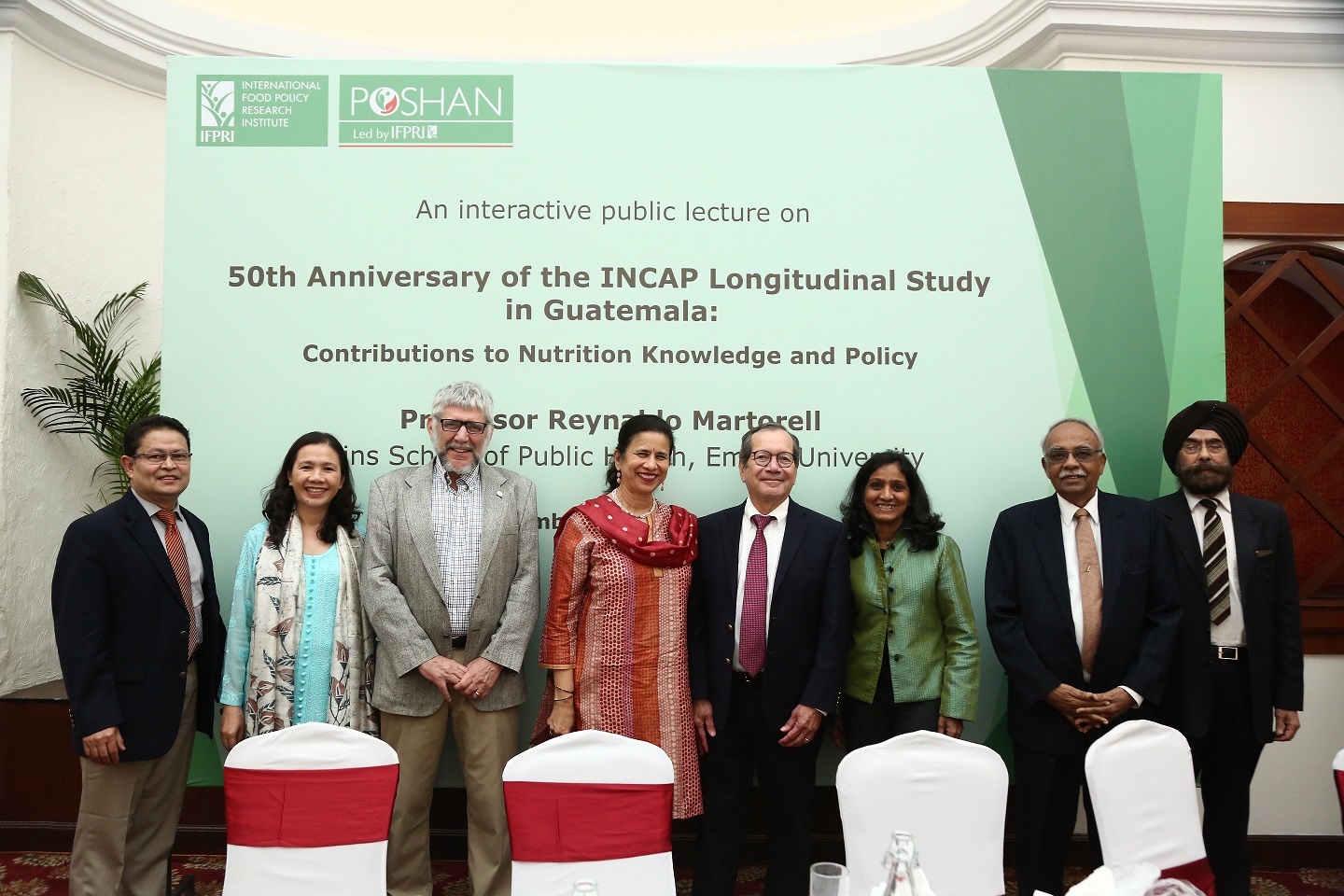This post is based on the first event of a new Public Lecture Series hosted by IFPRI’s South Asia Regional Office (SAR). The series aims to provide access to some of the world’s top academics, scholars and public figures and a platform to discuss innovations and new research-based policy solutions that sustainably reduces poverty and end hunger and malnutrition. More information will be available on the SAR website.
“Investments in improving nutrition in the first 1000 days should be considered as long-term economic investments because they improve human capital and productivity,” said Professor Reynaldo Martorell from the Rollins School of Public Health, Emory University (USA). He was speaking at a public lecture titled “50th Anniversary of the INCAP Longitudinal Study in Guatemala: Contributions to Nutrition Knowledge and Policy”, organized by the International Food Policy Research Institute.
This longitudinal, multidisciplinary nutrition intervention study was undertaken in rural Guatemala, from 1969 to 1977, by the Institute of Nutrition of Central America and Panama (INCAP) that yielded important results about impact on child growth and development. It is among the best-known nutrition intervention trials, having generated data on two generations of people from the study locations over the last 50 years. Several follow-up studies have been carried out and research in these Guatemalan villages continues. These studies have traced the long-term impact of the nutrition intervention on a wide array of outcomes, including human capital and adult health. These have been widely published in academic journals. Some of the seminal pieces of work are listed at the end of this write-up. Professor Martorell shared the major contributions from these studies to nutrition knowledge and policy.
The findings of this large-scale randomized nutritional intervention trial show that nutrition interventions can improve linear growth, if provided in early life, and lead to enhanced human capital and productivity. Nutrition is undoubtedly an engine of economic growth. “However, improvements in nutrition should be combined with an emphasis on healthy diets,” Professor Martorell cautioned, because there may be trade-offs in regards metabolic diseases.
This resonates with the current Indian scenario. A recent study published in The Journal of Nutrition, by researchers from the International Food Policy Research Institute (IFPRI) and Emory University, showed that over the past decade, on the one hand the prevalence of underweight decreased in India, while on the other the prevalence of overweight/obesity increased among adolescents and women, with high heterogeneity across states. The results of the recently released Comprehensive National Nutrition Survey (CNNS) also underscore the need of a strategic approach to address the complex challenge of malnutrition in India, that deals with undernutrition, overweight/obesity and micronutrient deficiencies.
Professor Santosh Bhargava, Founder of the New Delhi Birth Cohort, shared his experiences of a longitudinal study which was initiated in 1969 in a South Delhi urban community to study the survival and outcome of a birth cohort with special reference to physical and sexual growth, nutrition, development and family welfare practices. Currently it has a four-generation cohort. He emphasized on meticulous growth monitoring.
Pointing to the heterogeneity of influencing factors across different states of India, Professor HPS Sachdev, Senior Consultant, Sitaram Bharti Hospital and Medical Research Centre, said, “The contribution of different facets of development are different across the states of India. Population in India is undergoing a nutrition transition. We need better bio-markers for overall nutritional development than just height-for-age z scores and birthweight.” Instead of looking for a silver bullet for this complex problem of malnutrition, policymakers need to make strategic choices for addressing the relevant factors that would lead to overall development in the long run, Prof Sachdev emphasized.
Purnima Menon, Senior Research Fellow, IFPRI, highlighted the importance of social context while envisaging nutrition-related solutions. “It is encouraging to note the increasing significance being given to nutrition in food and agricultural policies,” said Shahidur Rashid, Director, IFPRI-South Asia, International Food Policy Research Institute.
Rebika Laishram is a Communications Specialist in IFPRI’s South Asia Regional Office. This piece originally appeared on IFPRI’s SAR blog, and is available along with links to research relevant to this lecture here.







